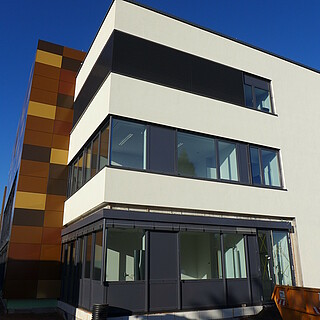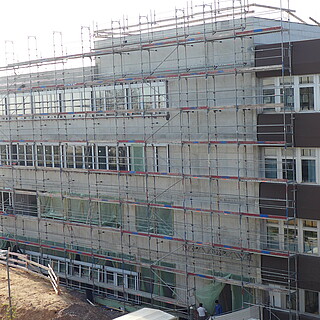Wine Campus on course for growth
For the winter semester, containers will cover the additional space requirements - state draws up a master plan for the site
The Wine Campus Neustadt was given more space in 2016 thanks to an additional building. But that is no longer enough , says Günther Hoos, Director of the Rural Area Service Center (DLR) Rhenish Palatinate, on whose site the Wine Campus Neustadt is located. A master plan is currently being drawn up for further structural development. Initially containers are to provide more space. They will be set up in the next few weeks.
"The building permit from the city has been granted and the containers should be in place by the start of the winter semester at the latest," says Hoos. DLR and the Wine Campus already have experience with containers. Before the new building could be used in 2016, containers had already provided additional space. They are now to be set up again in exactly the same place where the containers stood back then: at the rear of the site on the east side.
There will be twelve to 13 containers in total . There are several reasons for the additional space required. For example, the number of students has increased further due to the new Franco-German Master's degree program in Viticulture and Enology. Two of the containers are therefore needed for additional lecture halls.
There are also more and more research projects at the Wine Campus , says course director Prof. Dominik Durner , citing another reason for the need for space. This is recognition for the Wine Campus - and "we are of course proud of this," says Prof. Durner. Four containers are to be used for professors' research projects.
Another four containers are to be used as a quarantine station. A quarantine that, for once, has nothing to do with coronavirus. The quarantine station is needed for research and investigations that require high environmental and safety standards. These include new vine diseases, pests or invasive species.
Two to three containers will be needed as an alternative and storage area when the Wine Campus site is rebuilt. It is not yet possible to say when this will be, explains Günter Hoos. He assumes that this will be the case in two to three years.
The Landesbetrieb Liegenschafts- und Baubetreuung (LBB), which is responsible for all buildings in Rhineland-Palatinate, and the Ministry of Finance are planning the entire site of the Rural Area Service Center (DLR) Rhenish Palatinate and the Wine Campus . The aim is to create a so-called master plan. The main focus is on how much space is needed in which areas, where existing space can possibly be better used and where construction is needed, explains Hoos. The next step is to plan and secure funding. The fact that the Wine Campus wants to continue to grow must be taken into account.
Text: Annegret Ries, Rheinpfalz (17.06.2021)



